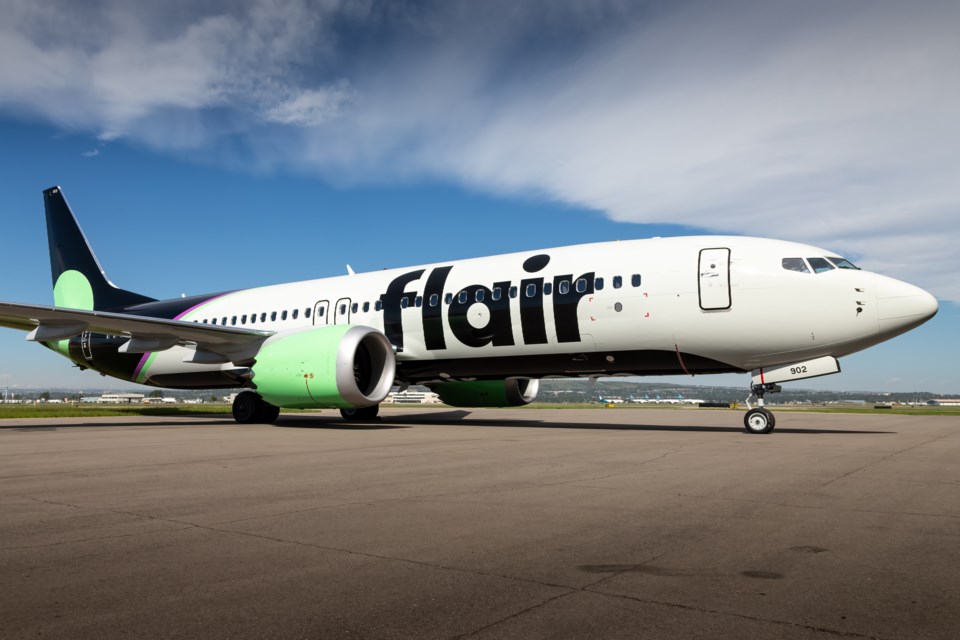Edmonton-based Flair Airlines' financial problems led to it having four planes repossessed on Saturday, and are making passengers wary about booking flights.
Even longtime ultra-low-cost carrier (ULCC) advocates advise against booking on Flair because of the risk of flight disruptions.
"I wouldn't fly on Flair – it's too scary for me," David Solloway told BIV. He was a , when he joined the yet-to-launch Canada Jetlines, and soon became its president.
Solloway said that if he booked a flight on Flair, he would fear last minute changes or cancellations.
Many on Twitter, including family members of stranded passengers concurred, saying that .
Bailiffs helped Dublin-based Airborne Capital Ltd. on March 11 issue Flair with lease-termination notices that put four Boeing 737 planes out of service.
Flair's CEO Stephen Jones today told a news conference that the " but Solloway said he doubted that Flair was unaware that its payments were behind.
"I find it all very mysterious on the Flair side," Solloway said.
"It's a process you go through, and I believe it is 90 days of non payment [before planes would be repossessed.] I have never seen their leases but I believe it is normal to go through 90 days of non-payment."
Having planes be repossessed is rare in the airline industry because, Solloway added, having planes is the "Holy grail" for revenue in the industry, as it is a necessity.
Another former executive from the ULCC niche, former Canada Jetlines chief commercial officer and University of British Columbia adjunct professor of aviation John Korenic, agreed.
Both he and Solloway said that the problems at Flair come as Canada remains in the nascent stage of having ultra-low-cost carriers.
There is some grey area between what constitutes a low-cost carrier, compared with an ultra-low-cost one, but many view Canada Jetlines, Swoop and Lynx Air as airlines that at least sometimes try to compete with Flair on price. Porter Airlines, in contrast, has shifted in the other direction and has started to become known as the Canadian airline that offers better service than others – for a slightly higher price.
ULCCs, such as EasyJet, Ryanair, Lion Air, and many others, have operated around the world for many years.
Korenic said that he thought that the problems at Flair may be self-contained because competitors appear to be well capitalized. Swoop has deeper pockets because WestJet is its parent company. Canada Jetlines today posted on its website that it has closed a previously announced $1.5 million loan transaction, and that it has entered into a new private placement with an arm’s length investor to raise $1,000,020. In the grand scheme of things, that is not much money, however.
"When I was with Canada Jetlines, the hardest thing was to find funding in Canada to to start up an airline," Korenic said. "Typically to start up an airline, you probably need in the order of $100 million to $250 million to really feel comfortable moving forward."
It was only in 2018 when ULCCs in Canada started to get off the ground.
Winnipeg's NewLeaf Travel Co. partnered with then-Kelowna-based charter-airline Flair for planes, crew and maintenance work, and . Flair then but continued to primarily be a charter airline. Flair then stopped charter flights, and .
Jetlines had planned to launch flights in early 2015 but glitches, as well as a lawsuit, delayed that launch. A complete corporate restructuring followed, before .
The grounded Flair planes cancelled flights across the country, including in Prince George. Nearly 1,900 people were affected.
The airline flies 88 flights out of Vancouver International Airport (YVR) each week, according to the Vancouver Airport Authority (VAA). Abbotsford International Airport (YXX) general manager Parm Sidhu told BIV that Flair flies about 35 flights weekly out of his airport, and that he .
Flair did not cancel flights at YVR and YXX, according to the VAA and Sidhu. The VAA told BIV in an email that there were "a few delayed flights."




